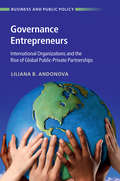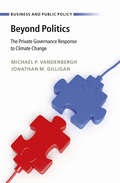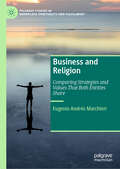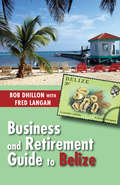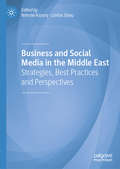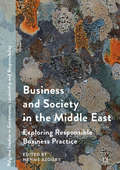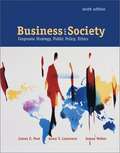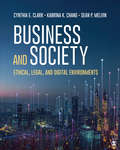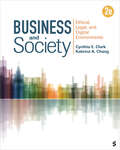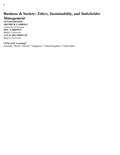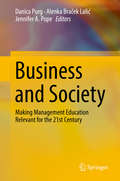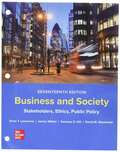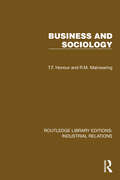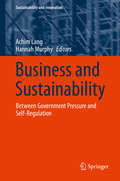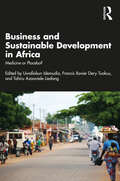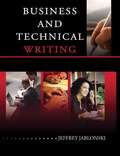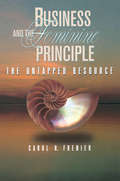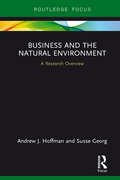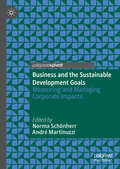- Table View
- List View
Business and Public Policy: International Organizations and the Rise of Global Public-Private Partnerships (Business and Public Policy)
by Andonova Liliana B.Global partnerships have transformed international institutions by creating platforms for direct collaboration with NGOs, foundations, companies and local actors. They introduce a model of governance that is decentralized, networked and voluntary, and which melds public purpose with private practice. How can we account for such substantial institutional change in a system made by states and for states? Governance Entrepreneurs examines the rise and outcomes of global partnerships across multiple policy domains: human rights, health, environment, sustainable development and children. It argues that international organizations have played a central role as entrepreneurs of such governance innovation in coalition with pro-active states and non-state actors, yet this entrepreneurship is risky and success is not assured. This is the first study to leverage comprehensive quantitative and qualitative analysis that illuminates the variable politics and outcomes of public-private partnerships across multilateral institutions, including the UN Secretariat, the World Bank, UNEP, the WHO and UNICEF.
Business and Public Policy: The Institutions Curse
by Victor MenaldoThe ʽresource curseʼ is the view that countries with extensive natural resources tend to suffer from a host of undesirable outcomes, including the weakening of state capacity, authoritarianism, fewer public goods, war, and economic stagnation. This book debunks this view, arguing that there is an ʽinstitutions curseʼ rather than a resource curse. Legacies endemic to the developing world have impelled many countries to develop natural resources as a default sector in lieu of cultivating modern and diversified economies, and bad institutions have also condemned nations to suffer from ills unduly attributed to minerals and oil. Victor Menaldo also argues that natural resources can actually play an integral role in stimulating state capacity, capitalism, industrialization, and democracy, even if resources are themselves often a symptom of underdevelopment. Despite being cursed by their institutions, weak states are blessed by their resources: greater oil means more development, both historically and across countries today.
Business and Public Policy: The Private Governance Response to Climate Change (Business and Public Policy)
by Michael P. Vandenbergh Gilligan Jonathan M.Private sector action provides one of the most promising opportunities to reduce the risks of climate change, buying time while governments move slowly or even oppose climate mitigation. Starting with the insight that much of the resistance to climate mitigation is grounded in concern about the role of government, this books draws on law, policy, social science, and climate science to demonstrate how private initiatives are already bypassing government inaction in the US and around the globe. It makes a persuasive case that private governance can reduce global carbon emissions by a billion tons per year over the next decade. Combining an examination of the growth of private climate initiatives over the last decade, a theory of why private actors are motivated to reduce emissions, and a review of viable next steps, this book speaks to scholars, business and advocacy group managers, philanthropists, policymakers, and anyone interested in climate change.
Business and Religion: Comparing Strategies and Values That Both Entities Share (Palgrave Studies in Workplace Spirituality and Fulfillment)
by Eugenio Andrés MarchioriThis book explores the connections between Christian religions and businesses. It examines how companies adopt tools traditionally used by churches to manage culture, strategy, and values while also exploring how churches leverage business strategies to achieve similar objectives. The author analyzes the mechanisms of influence both institutions use to internalize the "soul" of their organizations, including marketing systems, supported by real-world case studies. Later, he shows how companies like Coca-Cola behave like secular religions. He then compares how religious organizations—such as the Catholic Church, the Willow Creek Community Church, and the Jesuit Order—employ influence and business strategies similar to those of corporations like McDonald's, Mary Kay, and the consulting firm McKinsey & Co. By examining these parallels, this work reveals that business corporations and churches operate in fundamentally similar ways. Lastly, this volume estimates the monetary dimensions of what the author refers to as the &“salvation market.&” As society has become more demanding of corporate behavior, companies have responded by developing new areas—such as human resources to improve employee conditions, marketing to attract customers and talent, and the concept of stakeholders, which gave rise to a focus on ethical considerations, such as corporate social responsibility (CSR) as well as diversity and inclusion initiatives. The culmination of this process today is a strong emphasis on sustainability, showing how these new ethical values have gained prominence. Exploring organizational dynamics through a sociological lens, this book will appeal to researchers interested in organizational behavior, strategy, and marketing who seek to learn about the cultural dynamics of business and religious organizations.
Business and Retirement Guide to Belize: The Last Virgin Paradise
by Bob Dhillon Fred LanganBelize is an English-speaking tropical paradise, with an azure Caribbean coast, accessible rainforest, lost jungle cities, and a cost-of-living that makes it affordable for Canadians, Americans, Europeans, as well as the emerging middle class of Mexico and Central America. It is one of the worlds most undiscovered secrets, a retirement haven and a safe place to park your money. Business and Retirement Guide to Belize is an introduction to living, working, and retiring in Belize, as well as owning property there. Bob Dhillon introduces the reader to the country, its beauty and friendly people, as well as to its economic attractions. Belize is a moveable feast and the better you get to know it, the more you will enjoy it.
Business and Retirement Guide to Belize: The Last Virgin Paradise
by Bob Dhillon Fred LanganAn essential guide to living, working, and retiring in Belize. Totally updated, the second edition of the Business and Retirement Guide to Belize is an easy-to-read guide to investing, owning property, and retiring in Belize. Bob Dhillon, a successful real-estate developer in Belize, introduces the reader to the country, its beauty, its friendly people, and its economic attractions. A tropical paradise with beautiful beaches, accessible rain forest, and lost jungle cities, Belize also has a cost of living that makes it affordable for Canadians, Americans, and Europeans. Whether you are a retiree looking for a beautiful, safe, affordable home, or an investor or entrepreneur seeking an attractive business environment, Belize, with its relaxed investment rules and unbeatable lifestyle, has everything you could want.
Business and Social Media in the Middle East: Strategies, Best Practices and Perspectives
by Nehme Azoury Lindos DaouThis book discusses the effectiveness of Western organizations’ social media strategies in the Middle East. Social media has changed the rules of doing business, but the exact impacts vary across regions. In the context of Middle Eastern societies, social media is seen as a way for individuals and communities to communicate with each other and is generally not viewed as a means for brands to interact with individuals. Examining how the use of social media in the Middle East is shaped by the region’s culture, authors discuss the factors that businesses need to consider when creating digital marketing strategies targeted there. Including case studies of Middle Eastern companies, this book provides a comprehensive analysis of the rise of social media in the MENA region and the often-neglected role of culture in research in this area. It will provide researchers and practitioners with a deeper understanding of conducting business in the Middle East through the effective and efficient use of social media.
Business and Society in the Middle East: Exploring Responsible Business Practice (Palgrave Studies in Governance, Leadership and Responsibility)
by Nehme AzouryThis book discusses the unique relationship between societies and businesses in the Mediterranean region, with contributions from public figures and academics from Middle Eastern and Arab societies, as well as from North America and Europe. This blend of expertise and knowledge focuses on common business practices and their effect on society in Mediterranean countries, and aims to create a bridge between the two. Considering the cultural, social, political, legal and economic impacts and variety, Business and Society in the Middle East is a contemporary and authentic view of how local and traditional aspects of society dictate diversity and homogeneity within businesses.
Business and Society: Corporate Strategy, Public Policy and Ethics 10th ed.
by James E. Post Anne T. Lawrence James WeberPost, Lawrence, and Weber discuss the social and ethical impacts of business.
Business and Society: Ethical, Legal, and Digital Environments
by Sean P. Melvin Cynthia E. Clark Kabrina K. ChangRecipient of a 2021 Most Promising New Textbook Award from the Textbook & Academic Authors Association (TAA) Business and Society: Ethical, Legal, and Digital Environments prepares students for the modern workplace by exploring the opportunities and challenges they will face in today′s interconnected, global economy. The author team discusses legal and ethical issues throughout and uses real-world cases to provide students with a holistic understanding of stakeholder issues. Chapters on social media and citizen movements, big data and hacking, and privacy in the digital age provide in-depth coverage of how technology is transforming the relationship between organizations and consumers. Included with this title: The password-protected Instructor Resource Site (formally known as SAGE Edge) offers access to all text-specific resources, including a test bank and editable, chapter-specific PowerPoint® slides.
Business and Society: Ethical, Legal, and Digital Environments
by Sean P. Melvin Cynthia E. Clark Kabrina K. ChangRecipient of a 2021 Most Promising New Textbook Award from the Textbook & Academic Authors Association (TAA) Business and Society: Ethical, Legal, and Digital Environments prepares students for the modern workplace by exploring the opportunities and challenges they will face in today′s interconnected, global economy. The author team discusses legal and ethical issues throughout and uses real-world cases to provide students with a holistic understanding of stakeholder issues. Chapters on social media and citizen movements, big data and hacking, and privacy in the digital age provide in-depth coverage of how technology is transforming the relationship between organizations and consumers. Included with this title: The password-protected Instructor Resource Site (formally known as SAGE Edge) offers access to all text-specific resources, including a test bank and editable, chapter-specific PowerPoint® slides.
Business and Society: Ethical, Legal, and Digital Environments
by Cynthia E. Clark Kabrina K. ChangRecipient of a 2021 Most Promising New Textbook Award from the Textbook & Academic Authors Association (TAA) Business and Society: Ethical, Legal, and Digital Environments, Second Edition prepares students for the modern workplace by exploring the opportunities and challenges that individuals and businesses face in today′s increasingly global and digital world. Authors Cynthia E. Clark and Kabrina K. Chang present unique chapters on social media, big data and hacking, and privacy, diving deeper into the new legal and ethical challenges that are unleashed by our society′s use of and dependence on technology. Real-world case studies, ethical dilemmas, and point-counterpoint debates provide students with hands-on opportunities to apply chapter concepts and develop critical thinking skills as they explore the relationship among businesses, their stakeholders, and their shareholders. The Second Edition includes new cases and expanded coverage of global issues, the future of work, artificial intelligence and consumer rights.
Business and Society: Ethical, Legal, and Digital Environments
by Cynthia E. Clark Kabrina K. ChangRecipient of a 2021 Most Promising New Textbook Award from the Textbook & Academic Authors Association (TAA) Business and Society: Ethical, Legal, and Digital Environments, Second Edition prepares students for the modern workplace by exploring the opportunities and challenges that individuals and businesses face in today′s increasingly global and digital world. Authors Cynthia E. Clark and Kabrina K. Chang present unique chapters on social media, big data and hacking, and privacy, diving deeper into the new legal and ethical challenges that are unleashed by our society′s use of and dependence on technology. Real-world case studies, ethical dilemmas, and point-counterpoint debates provide students with hands-on opportunities to apply chapter concepts and develop critical thinking skills as they explore the relationship among businesses, their stakeholders, and their shareholders. The Second Edition includes new cases and expanded coverage of global issues, the future of work, artificial intelligence and consumer rights.
Business and Society: Ethics, Sustainability and Stakeholder Management (Mindtap Course List)
by Archie B. Carroll Jill Brown Ann K. BuchholtzBUSINESS AND SOCIETY employs a stakeholder management framework. This framework emphasizes a business's social, legal, political, and ethical responsibilities to both external and internal groups that have a stake, or interest, in that business. It is a fundamental goal of the course that students really get that responsible business decision makers strive to balance and protect the interests of various stakeholders-investors, employees, community, environment, etc. An emphasis is also placed on the fact that one needs to understand that business situations will continually arise that will truly test ones values and ethics. <p><p> BUSINESS AND SOCIETY not only exposes students to diverse and important stakeholder and ethical frameworks for considering and protecting stakeholder interests, through its use of cases and other real-world applications, this text enhances the precision with which students think about and practice ethical decision making. Opportunities to apply stakeholder and ethical systems to specific business problems abound, and questions are provided with all cases and applications to focus student reasoning, ensuring excellent preparation for class discussions.
Business and Society: Making Management Education Relevant for the 21st Century
by Danica Purg Alenka Braček Lalić Jennifer A. PopeThe world of business is constantly evolving and management education institutions will likely face a number of challenges in keeping up with these changes. While most books focus on the needs of management education institutions, this work addresses the needs of the corporate world in the era of the Fourth Industrial Revolution. Featuring an extensive research study spanning 11 countries, it offers a unique perspective on the business challenges and developmental needs of companies in emerging and recently emerged economies, and on the missing links between those needs and management education. Using both company-specific and country-level data, the book provides businesses and educators with rare insights and recommendations on strengthening existing partnerships (or establishing them anew) between management education institutions and the corporate sector in order to make management education relevant for the 21st century. The book argues that ‘relevance’ should take the center-stage of all higher education institutions in order to accomplish their third mission, namely service to society. This is especially important for management education institutions, whose mission is to mold future managers and leaders who can have a significant influence on economic success and the wellbeing of society.
Business and Society: Stakeholders, Ethics, Public Policy
by Anne T. Lawrence James WeberIn a world economy that is becoming increasingly integrated and interdependent, the relationship between business and society is becoming ever more complex. The globalization of business, the emergence of civil society organizations in many nations, and new government regulations and international agreements have significantly altered the job of managers and the nature of strategic decision making within the firm. The Seventeenth Edition of Business and Society: Stakeholders, Ethics, Public Policy draws on the latest research to address the challenges facing business organizations and their stakeholders. The text builds on its legacy of market leadership by reexamining central issues.
Business and Sociology (Routledge Library Editions: Industrial Relations)
by T.F. Honour R.M. MainwaringBusiness and Sociology (1982) is a sociological perspective on business that examines industrialisation, capitalism, organisation, management, work, and industrial relations. It approaches the subject with an acknowledgment of its capitalist nature, rather than organisational or industrial nature.
Business and Sustainability: Between Government Pressure and Self-Regulation (Sustainability and Innovation)
by Achim Lang Hannah MurphyDemands for sustainability policies have set new challenges for business both on the individual firm level and on the level of organized business interests. This edited volume brings together economic, social, environmental, and cultural dimensions of sustainability that comprise different challenges for business processes and activities. The aim is to develop an overarching framework to the study of sustainability and business and to advance an interdisciplinary analytical perspective. The book establishes a balanced account that equally represents business as problem causers as well as problem solvers, and therefore responds to the urgent need to investigate the intersection between sustainability issues and business participation.
Business and Sustainable Development in Africa: Medicine or Placebo?
by Uwafiokun Idemudia, Francis Xavier Dery Tuokuu, and Tahiru Azaaviele LiedongThe book offers new critical insights into the relationship between corporate social responsibility (CSR) and sustainable development in Africa. The extent to which CSR initiatives can contribute to sustainable development in Africa remains debatable. This book examines in a very clear structure how, when, and whether CSR initiatives are able to contribute to the realization of the sustainable development goals, peace, and environmental sustainability at the micro-levels of society. It also explores some macro-level issues such as the relationship between taxation and CSR, CSR and human rights, and CSR and public governance and, in so doing, challenges existing CSR dogmas. With themes aligned with the UN Sustainable Development Goals (SDGs), this book provides useful practical guidance for policymakers and business leaders seeking to better understand the strength and limitations of CSR as a vehicle for advancing sustainable development in Africa. It will also appeal to scholars, researchers, and students of African studies, development studies, international business, strategic management, and business and society.
Business and Technical Writing
by Jeffrey JablonskiExperts now believe that multiple literacies are necessary for communicating effectively in today's business and technical settings. Part I of this textbook acquaints you with these literacies as well as the typical genres, or forms, of business and technical writing, including memos, letters, e-mails, resumes, reports, and presentations. Part II of this textbook offers a number of writing projects that require you to apply the relevant principles of effective written communication from Part I.
Business and the Feminine Principle
by Carol R. FrenierBusiness and the Feminine Principle: The Untapped Resource describes in lay persons' language the essence of the archetypal feminine and its potential for business. This book shows both women and men how the feminine principle works in human thought and behavior and what it could mean for business if we gave the feminine principle the same kind of attention and support in the work place that we give to masculine consciousness. Business and the Feminine Principle goes beyond the well-established conversation about the need for feminine attributes in business and invites both genders into an exciting new collaboration. By no means a critique of what is wrong with masculine perception and behavior in business, this book inspires new respect for the integrity of both masculine and feminine energy and their ability to co-create a viable future for all of us.
Business and the Global Environment
by Karl PetrickTextbook covers: Globalization,Global Logistics, International Outsourcing, sweatshops,Cultural Differences and other related topics.
Business and the Natural Environment: A Research Overview (State of the Art in Business Research)
by Andrew J. Hoffman Susse GeorgThe fields of corporate environmentalism, green business and corporate sustainability have grown significantly over the past twenty-five years, such that the academic research domains of business decision-making, accounting, organizational behaviour, and the protection of the natural environment have developed into maturing areas of study within the management sciences. Business and the Natural Environment: A Research Overview is a summary of the research thus far on this topic, offering a structure for understanding its emergence and growth, the multiple facets that make up its present state and a glimpse into the future of where it may be going. Along the way, the authors provide a compendium of its important works to help situate the interested reader in the landscape of the field. One important element of this work is its topical relevance; issues of environmental protection (and more recently sustainability) are critically important in today’s worlds of business, policy, and public understanding. Scholars who choose to enter this domain have much to offer of societal value while at the same time, entering a non-fully legitimate research stream that can lead to academic success (such as tenure). This shortform book provides a research map for both new scholars who wish to enter the field and more seasoned researchers who wish to understand one view of the landscape and how they might fit within it. This expert survey of the existing literature brings the research story into the age of the Anthropocene and is essential primary reading.
Business and the Sustainability Challenge: An Integrated Perspective
by Peter N. NemetzIt is vitally important for businesses to have a holistic understanding of the many issues surrounding and shaping sustainability, from competitors to government and political factors, to economics and ecological science. This integrated textbook for MBA and senior-level undergraduates offers a comprehensive overview of the issues of sustainability as they relate to business and influence corporate strategy. It also features a wide range of cases and an extensive discussion of tools to incorporate sustainability issues into strategic decision making, helping instructors and students to build and then apply a solid understanding of sustainability in business.
Business and the Sustainable Development Goals: Measuring and Managing Corporate Impacts
by André Martinuzzi Norma SchönherrThis innovative and engaging book discusses the contribution of business to the Sustainable Development Goals (SDGs) adopted by the United Nations in 2015. It critically analyses selected impact measurement and management tools to highlight their respective benefits and limitations, and also provides guidance on critical management decisions to support high-quality impact measurement and management. The analyses underlying this book are the result of a three year research project conducted by an international consortium in the EU-funded research project GLOBAL VALUE – Managing Business Impact on Development. The research is complemented by examples from corporate practice and expert interviews to demonstrate and measure the contribution of business to sustainable development in the context of the SDGs.
